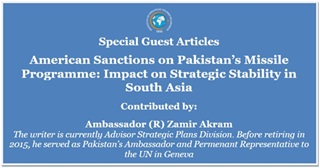In December 2024, new American sanctions were imposed on Pakistani entities for allegedly developing long-range missiles. Moreover, a few days later, the then Deputy National Security Advisor in the former Biden administration, Jon Finer, charged that Pakistan’s development of long-range missiles “will have the capability to strike targets well beyond South Asia, including the United States.” He added that “it was hard for us to see Pakistan’s actions as anything other than an emerging threat to the United States.” Asked as to why Pakistan, which has repeatedly stated that its strategic programme is India-centric, would threaten the U.S., Finer refrained from providing an answer. The fact is that there is no logical or rational answer to such absurd charges. The real reason is America’s discriminatory approach to Pakistan’s strategic programme, including its missile programme, which has come under several layers of discriminatory sanctions over the past several years.
The history of American sanctions against Pakistan can be traced back to developments in 1974 following India’s first nuclear test. Instead of punishing India for nuclear proliferation, the U.S. adopted several laws, such as the Symington, Glenn, and Solarz amendments, which were essentially meant to prevent Pakistan from developing its own nuclear weapons capability for credible deterrence against India. Thereafter, the Pakistan-specific Pressler amendment was adopted, which was imposed in 1990 on the spurious claim that Pakistan had developed nuclear weapons, though none had been tested nor had Pakistan’s nuclear capability changed since the previous Presidential certification the year before that Islamabad had not crossed the nuclear weapons threshold.
Even though these sanctions were eventually lifted when the U.S. needed Pakistan’s cooperation in its war on terror, following the terrorist attacks in the U.S. on September 11, 2001, the equipment sanctioned under the Pressler Law, especially F-16 aircraft, was never delivered to Pakistan. Instead, Pakistan was compensated for the funds it had spent on the embargoed F-16s by American soybeans that it did not need! Denial of F-16 aircraft, which were potentially the delivery vehicle for nuclear weapons that Pakistan could be forced to develop if India conducted more nuclear tests or threatened Pakistan’s security, increased Pakistan’s strategic vulnerability. This situation required the development of alternative delivery systems, specifically missiles of different ranges and payloads. An added compulsion was the Indian development of its own missile capabilities, especially the Pakistan-specific Prithvi missile and its deployment near Pakistan’s borders in 1997.















